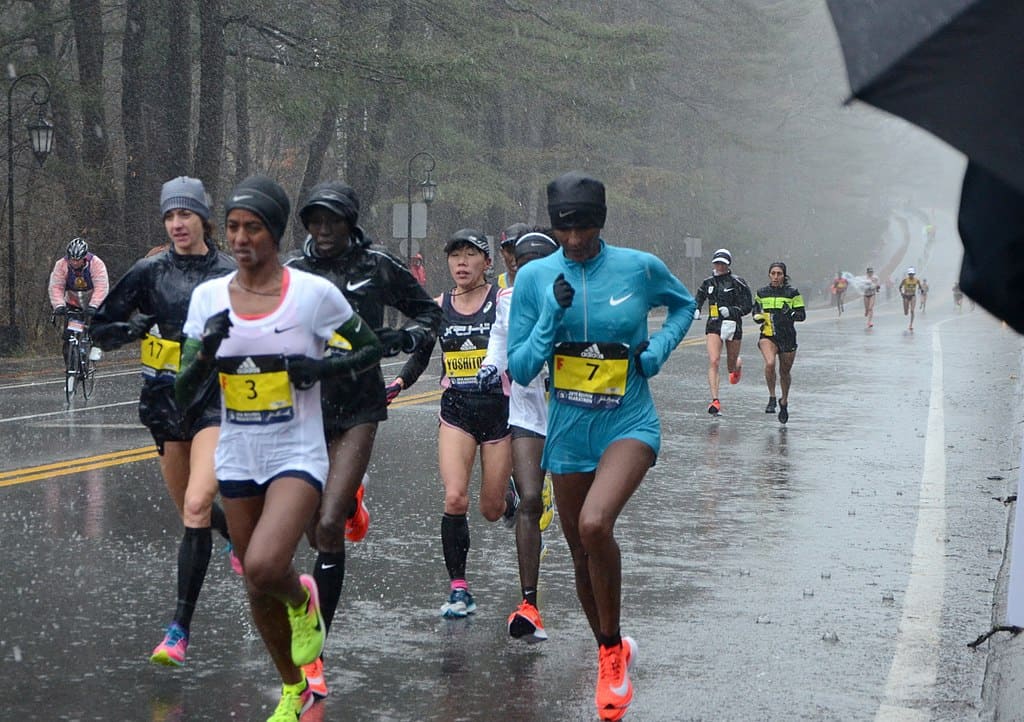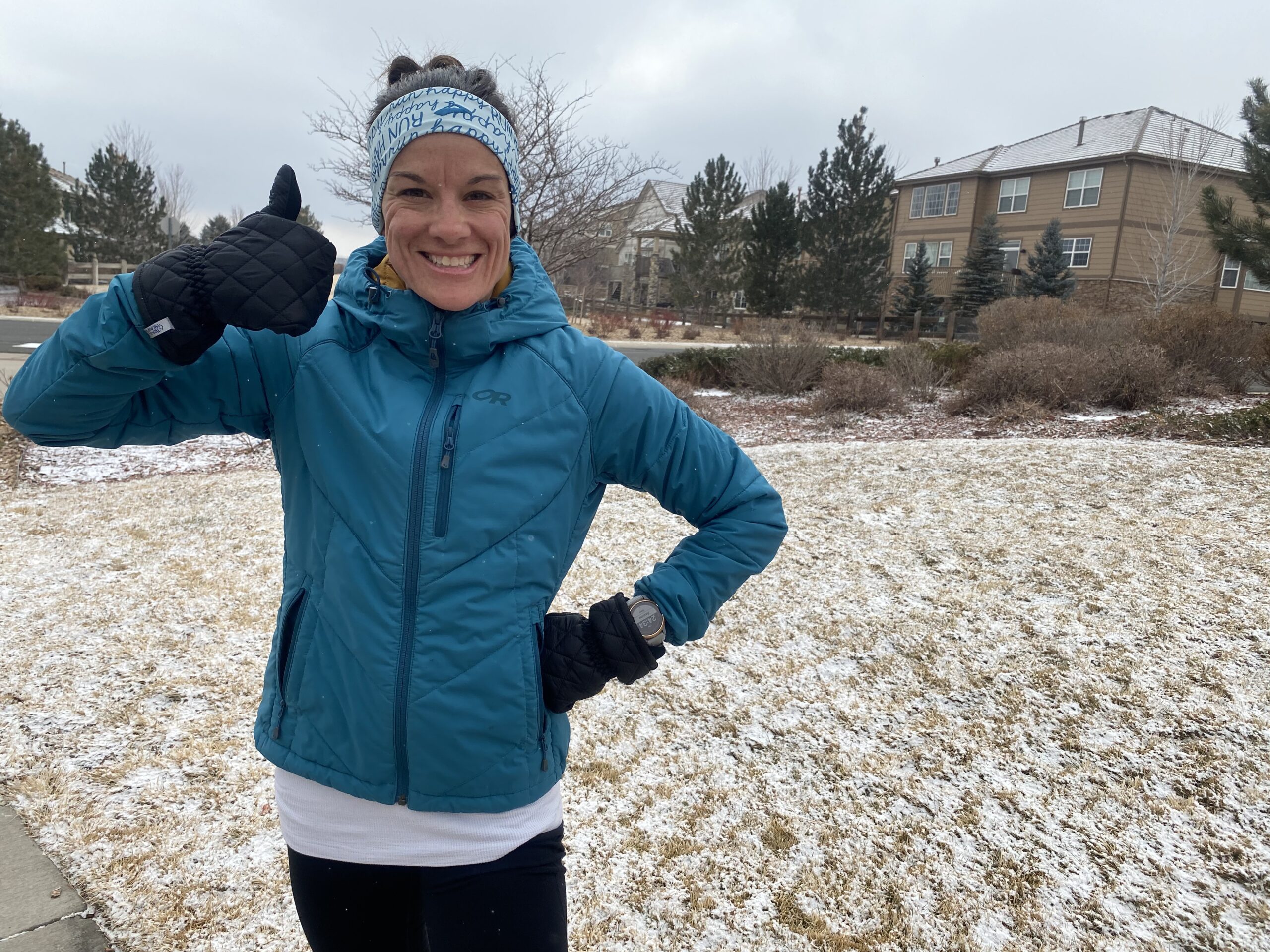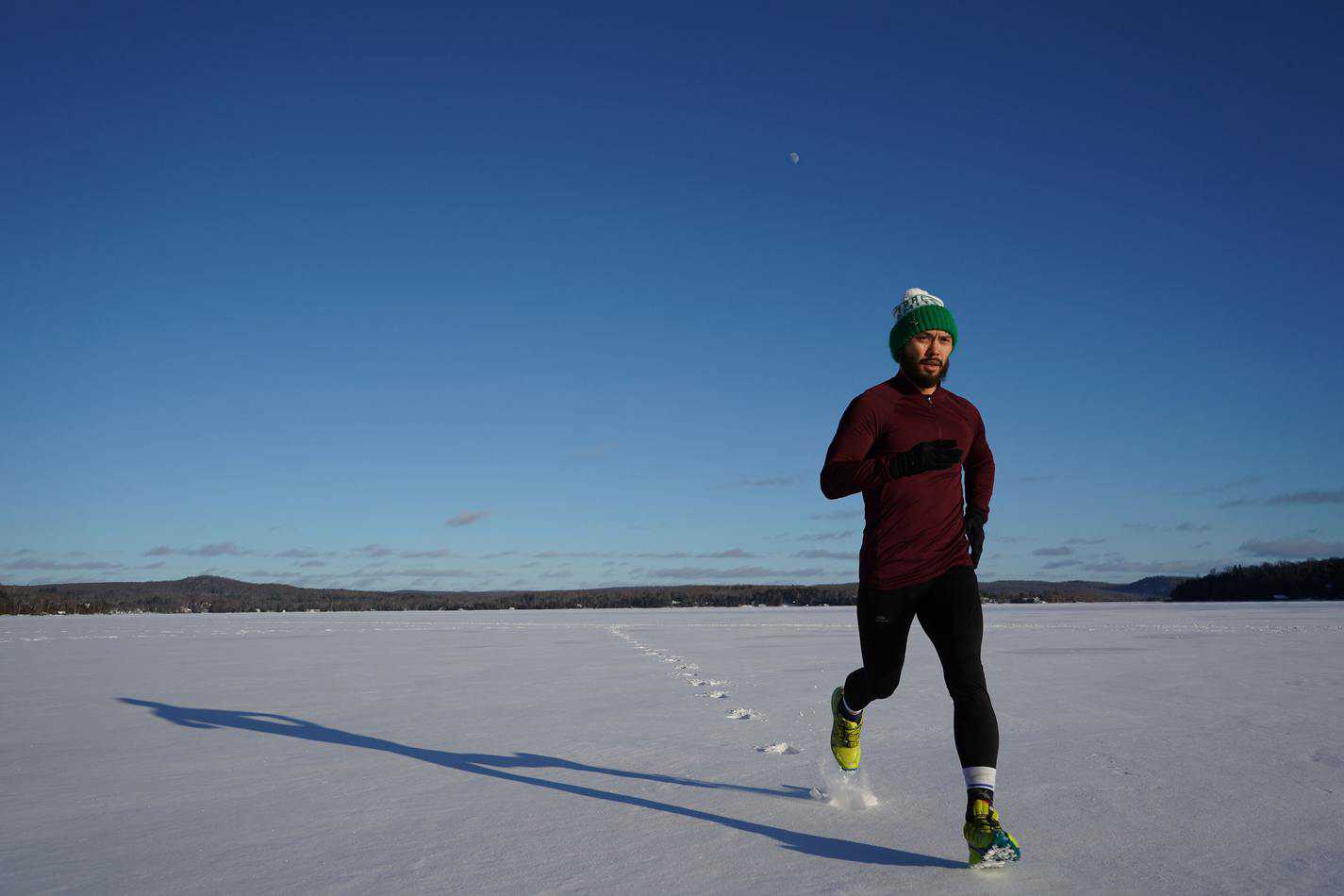DNF. These are three letters no one ever wants to see next to their name on the results page of a race. And especially in a race as long as a marathon. Though I’ve been lucky enough to avoid this happening, I would never let myself believe that I was immune to not finishing a beast like a marathon. Especially since I’ve had the person closest to me experience a gut-wrenching “DNF” marathon.
What is DNF? The acronym DNF stands for “Did Not Finish.” It can happen in any race, but the amount of time and effort a person puts into training for a marathon makes this scenario especially devastating.
My hope for you is that you’ll never have to experience this situation. However, there are times when choosing not to finish a marathon is a safer and smarter option – and sometimes your body chooses for you. Here we’ll talk about:
- how often DNFs happen
- why a marathon DNF happens (including my husband’s DNF at 24.3 miles in)
- healthy reactions to a failed attempt at the marathon distance.
- steps to take to ensure it doesn’t happen again (because you WILL try again).
How Often and Why a Marathon DNF Happens
There is a reason not very many people attempt running a marathon. They are extremely challenging! So a DNF happens more than you’d think. Last year, just over 500 people did not finish (DNF) the New York Marathon. While the percentage is quite low (about 1% – it’s a large race), it still proves that people are not alone when finding themselves in this position. And the NYC marathon is a lottery race that people wait years to get into, so we have to assume that these people were preparing themselves to go the distance.
There are several reasons why a person might not finish their marathon. Here are the top 3:
Inexperience
Though I haven’t had the unfortunate experience of not finishing a race, I did complete two marathons in my 20s where the last 6 miles included way more walking than I’d like to admit. Not that there is anything wrong with walking a marathon if that’s your plan of action, but I wanted to run the entire way. Unfortunately, “wanting” and “executing” are two different things when training hasn’t prepared you for that particular outcome.
Being new to the marathon distance leaves room for a lot of preparation error. It’s hard to know what to eat, when to eat, what to drink, what pace to go out, and on and on. So many factors contribute to the outcome of the race. Getting that first marathon under your belt is a BIG DEAL!! Even if it is a DNF. You will absolutely learn from it to have a better outcome the next time.
Poor Weather Conditions
Unpredictable and extreme weather can often be a factor where DNFs are concerned. The 2007 Chicago Marathon, for example, temperatures unexpectedly soared to the upper 80s. Many runners were unprepared for the heat that plagued the course that day. With hundreds of runners falling ill (and even one death) the race was shut down around 11:30. Many runners were unable to finish that day and going on to finish was deemed unsafe.
Conversely, the cold, wet weather of the 2018 Boston Marathon led to 23 DNFs among elite runners, with many more within the citizen’s race. Yes, even elite runners DNF – it’s not just for novice runners.
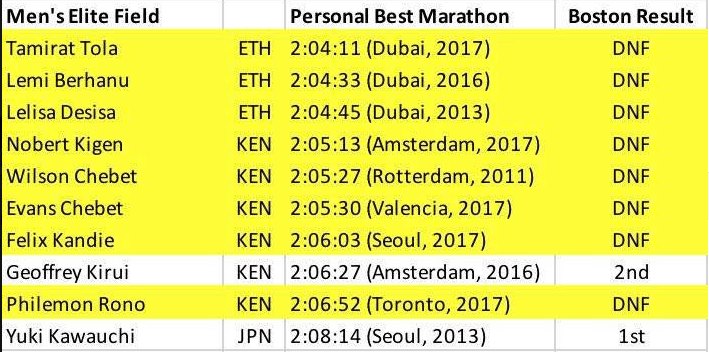
![Gr5555 [CC BY-SA 4.0 (https://creativecommons.org/licenses/by-sa/4.0)] A "citizen" ended up winning the 2018 Boston Marathon. Many elites had a DNF.](https://readysetmarathon.com/wp-content/uploads/2019/06/1024px-Boston_Marathon_2018_lead_men-dnf.jpg)
A “citizen” Yuki Kawauchi ended up winning the 2018 Boston Marathon. Many elites had a DNF.
Your Body Says “Not Today”
Unfortunately, this is a reality in marathons. You can be completely prepared and something can still go wrong. Maybe you wake up with an illness. Another possibility is that you push yourself so hard that an injury pops up mid-race that you’ve never experienced before. If you’ve every had a calf muscle pull, for example, you literally can’t keep running. You’ll of course question over and over what you could have done differently, but sometimes, it just wasn’t your day. It could happen to anyone!
I can’t imagine the emotional toll it takes on someone to feel like they can’t finish their race. Whether they have prepared “properly” or not, anyone who is running a marathon has very likely put an extreme amount of effort into getting ready for race day. Including my husband.
My Husband’s DNF
Before we had our third child, my husband, Patrick, and I had run a number of short races together and even a couple of half marathons. Though he enjoyed running I’m not sure he had the “bug” quite as much as I did. But, he decided that with a third child on the way it was as good a time as any to check the marathon off the ol’ bucket list.
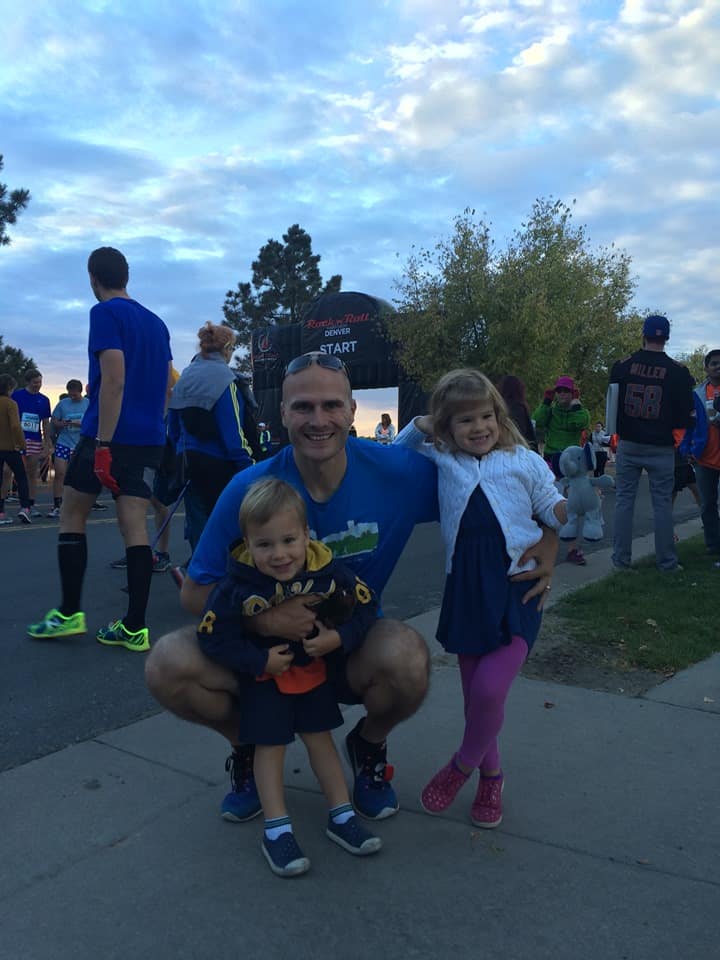
He printed a training plan. He followed it closely and while the rest of us hurried off to the pool on summer weekends, he diligently completed his long runs. When the day came for his race, he was expectedly nervous but felt healthy and ready to accomplish his goal. Pregnant me toted my two kids to various points along the race to cheer on the Daddy we were so very proud of.
One thing Patrick was careful about was not going out to fast. This is a mistake that a lot of first-time marathoners make, but he played it safe. Pictures don’t always tell the story, and in the one below, he was happy to see his babies cheering him on. But, he said he didn’t feel right from the get-go. Throughout his training, he could never quite get the fueling right, often leaving him nauseous and undernourished for the mileage.
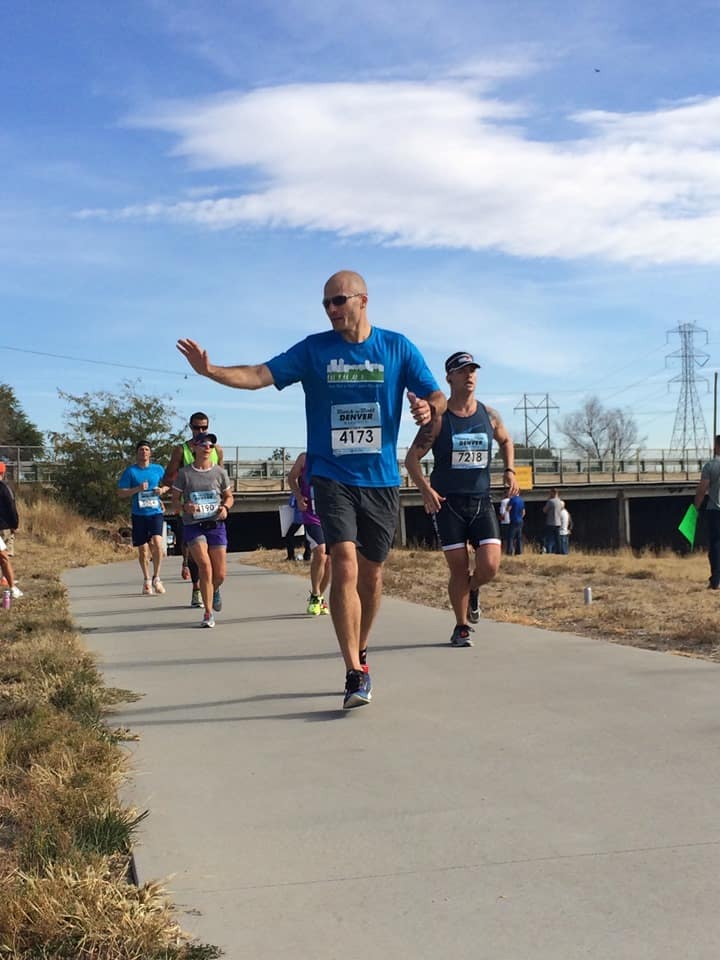
By mile 19 he began to walk. Considered “the wall,” this is not an abnormal time for a marathon runner to feel a drop in performance. Legs get heavy, and glycogen stores have likely been depleted. But this was extreme.
He explains, “No matter how much I drank, I couldn’t quench my thirst. I began to feel dizzy. It was so hot that day.”
Feeling like it would pass, he kept up a run/walk pace for the next couple of miles. As his calves began cramping up, he could no longer continue running. Hoping the nausea would pass with walking and continued hydration, he kept on. “Instead of getting better, it was quickly getting worse. I felt like I was going to throw up at any minute and I was trying not to pass out.” When he saw the medical tent, he did not question whether or not he’d stop. At that time, he didn’t know if he’d finish or not – his main concern was getting the help he knew his body needed.
An EMT quickly came to his aid and laid him down. It was clear to them that he was dehydrated and told him so. They gave him a bottle of Gatorade loaded down with extra salt. He promptly threw it all up. In that moment the EMT looked at Patrick and said, “It’s probably best that you don’t finish this race.”
We had been worried sick not knowing where he was, thinking he should have crossed the finish long before, when the phone rang. He told me his location. He’d be going home without his finisher’s medal and the satisfaction of checking off a bucket list item. Having completed two marathons myself, and knowing how much time and effort he devoted to accomplishing this, my heart ached for him. He was devastated.
Reaction to a DNF Marathon
Marathon runners who go through a DNF experience will surely have a range of emotions. Whether your DNF was caused by missing the cutoff time, walking off the course, or because of illness or injury, no one goes into a marathon thinking they aren’t going to finish. It’s a devastating experience that leaves you wishing you did something differently and asking “what if?” If you’re like my husband, you’re probably analyzing the events of the day on repeat, hoping to pinpoint why it all went wrong. All of the reactions you have are completely normal.
It’s OK to Be Angry
Though being angry with yourself probably isn’t doing you any good, it’s human nature. It’s ok to take a little time to essentially “grieve” the loss of the accomplishment you worked tirelessly for. It sucks and you’re welcome to feel all the feels during those days after.
Identify the Issues
The thing is, you don’t want to stay angry, because that isn’t healthy. Bitterness keeps you from moving forward. Part of moving on is facing the issues that occurred that day head-on. Writing down feelings and symptoms you had during your race while it’s still fresh in your mind will allow you to take a course of action to ensure the next time is a success.
Don’t Let It Define You
Setting goals and achieving them is an important part of life. But guess what? People fall short of their goals all the time. Life would be pretty boring if we accomplished everything we set out to do on the first try. And things happen. You are human and there are so many variables that can play out. Marathons are hard!! Be proud of all you accomplished to get to that point. In my husband’s case, he could have let the fact that he was less than 2 miles away from the finish make him feel like he gave up. Instead, he used those 24.3 miles, the furthest he’d ever run in his life, for leverage. Don’t let one DNF define who you are as a marathon runner.
Recover
Even though you didn’t go the entire 26.2 distance, you need to let your body recover properly before diving into your next running goal. This is important in ensuring that you are healthy enough to train again for a marathon. Only you can know what’s best for you, but a recovered body is certainly ideal. Recovery also includes your mind. Part of recovering your mind means reading stories about other runners who pushed through their DNF to try again. This can be just the motivation and inspiration you need to move on.
Try Again
When the time is right, you’ll try again. I hope you never, ever let one failed attempt allow you to think that you aren’t able to run a marathon. You are stronger than you think!
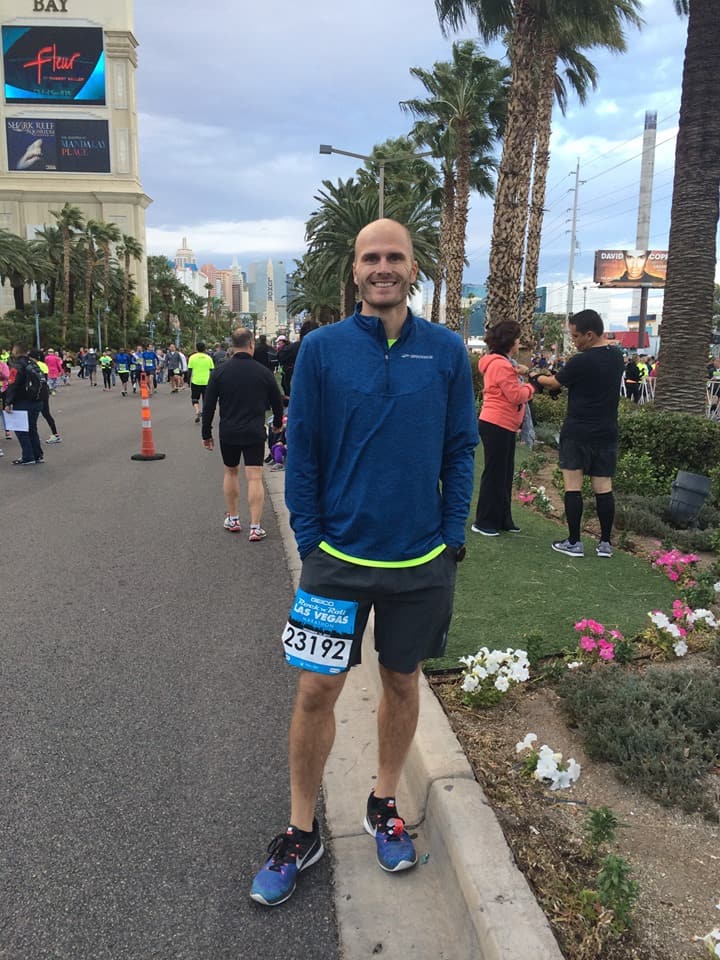
Steps to Ensure You Won’t DNF Again
Quite possibly the scariest part of all of this is picking yourself back up to try again. It’s hard enough to have to know you “failed” at something you worked so hard for; the fear of it happening all over again is often what keeps people from giving it another go. And rightly so. It didn’t feel good once and it certainly wouldn’t feel good reliving the entire experience.
By revisiting the events of that day, you’ll be able to see what it is you need to differently to avoid another DNF. Here are my tips to making your next marathon a success:
- Hydrate more than you think you should. Plenty of water and electrolytes the day before and morning of the race are important. Drink at every aid station so you don’t forget.
- Figure out your nutrition. Not eating enough or eating the wrong things are major culprits that can lead to a DNF. This was my husband’s issue – after lots of trial and error my husband and I both found something that worked great for us! (This is the product – I hope to write about it soon! Sword Performance)
- Run enough miles – running 3 days a week is not enough for most people to run a marathon to the best of their ability. And if you are skipping lots of training runs, you won’t be ready. This is a major factor in making it through 26.2 miles.
- Run Slower – I talk a lot about it in my article “Train Slower to Run a Faster Marathon“. Except it’s not just about being faster, it can also be what you need to do to run enough miles to prepare for your marathon.
- Hire a Coach – A coach can help you with everything I listed above. This is an excellent way to get an experienced marathon runner to guide you on your journey toward the marathon finish you always dreamed of.
You Will Prevail
My husband made the hardest and best decision by choosing not to finish his very first marathon. You have to take care of yourself first. Sometimes that means making the difficult decision to take a DNF. Afterward, you recover and you persevere.
Here is my husband’s story on finishing his first marathon.*
One week after my husband’s DNF at the Denver Marathon, he went out for a 22-mile training long run. He wanted to prove to himself that he had what it took to complete a marathon and that what happened at the marathon was an anomaly. That night, he signed up for the Las Vegas Rock ‘N Roll marathon. It was two weeks away. Those 14 days flew by.
I’m happy to say, that night, he completed his first marathon. I believed in him and knew he could do it, but I’d be lying if I said I was breathing easy before he crossed that finish line. I was an absolute puddle as I saw him run down the strip on that home stretch. It was triumph at its finest and I will never forget our embrace as I finally was able to make my way to him. Proud doesn’t even begin to describe how I felt about his brave accomplishment in that moment.
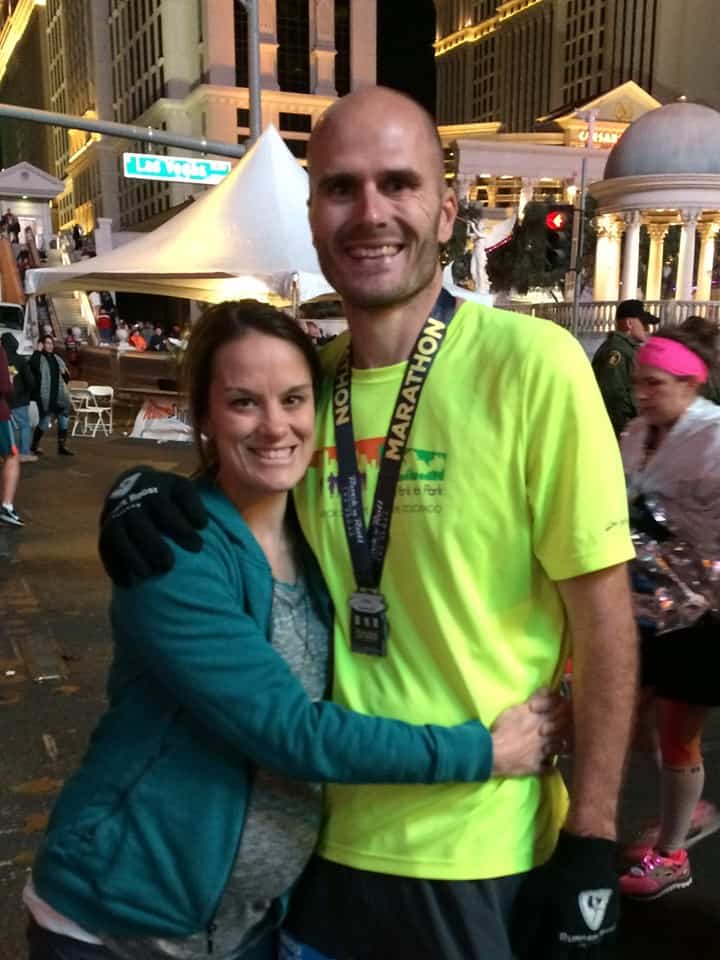
Feeling like you have the letters DNF stamped to your forehead for the rest of time isn’t something you’d choose. And if it does happen to you? You don’t let it define you.
Trying again when you fail takes true bravery.
“Success is not final, failure is not fatal: it is the courage to continue that counts.” -Winston Churchill.
*My husband ran a marathon 3 weeks after his DNF. I do not recommend this as it’s not the healthiest choice for a body that just ran their hardest for a good part of a marathon. However, the mind is a powerful thing. For my husband, he really needed to finish one to move forward. Only you can truly know what’s best for you. All the best!
